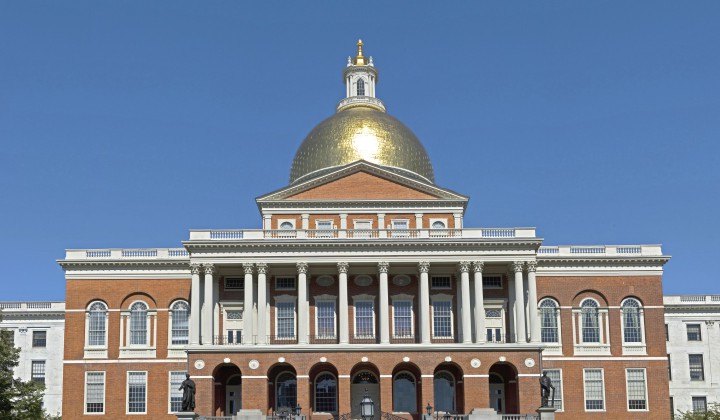6,000 Massachusetts Voters Urge Lawmakers to Expand Solar Net Metering Program

Today, solar advocates delivered more than 6,000 petition signatures from Massachusetts voters urging state lawmakers to raise the cap on one of the Commonwealth’s most successful solar programs: net metering. The demonstration of public support comes less than a week after the Massachusetts Senate unanimously passed S. 1973, which will increase the cap and clear the way for continued solar energy growth. The bill must now be passed by the House of Representatives and signed by Governor Charlie Baker to become law.
“Solar power is building healthier communities, a stronger local economy and a more resilient energy system, and as we’ve seen today, that’s what Massachusetts voters want for our state. We thank Senator Downing and his Senate colleagues for their tireless leadership, and we encourage their counterparts in the House to act quickly to raise the net metering cap so that solar can keep working for the Commonwealth,” said Sean Garren, Northeast Manager for Vote Solar.
Net metering gives renewable energy customers full credit on their utility bills for the excess power they deliver to the electric grid. This simple crediting arrangement is one of the most effective state policies for enabling families, businesses, schools and public agencies to go solar. Existing Massachusetts law places a cap on net metering participation, after which utilities are no longer required to offer this important customer right to new non-residential solar energy customers. Unfortunately, the net metering cap for many public, private and community shared projects in National Grid’s service territory has already been hit, putting hundreds of solar projects in 171 cities and towns at risk. If the House does not follow the Senate in raising the net metering caps before the end of the legislative session this week, most of these projects will not move forward.
"Clean energy is good for our communities," said Joel Wool, Energy Advocate with Clean Water Action, an organization that participated in the petition drive. "For renters, residents of low-income housing, and Gateway Cities, Massachusetts' innovative solar policies are creating cost-effective solutions to a power grid troubled by a terrible addiction to fossil fuels. Lifting the net metering cap is essential to ensuring that people at the margins of our economy have access to affordable, clean energy."
An amendment to increase the state’s solar net metering cap was adopted during debate last week on S. 1973, An Act providing for the establishment of a comprehensive adaptation management plan in response to climate change. The amendment, sponsored by Co-Chair of the Telecommunications, Utilities and Energy Committee, Senator Benjamin B. Downing (D- Pittsfield), aligns the net metering cap with the state’s 1600 megawatt (MW) goal of installed solar capacity and further directs the Department of Energy Resources (DOER) to carefully consider changes to the compensation structure and related programs for customers who go solar after the MW goal has been reached. The amendment also supports the continued growth of community shared solar, which allows equitable renewable energy access for residents who may not otherwise be able to go solar.
“We thank Senator Downing, Senate President Rosenberg, and the entire senate for their bipartisan leadership and commitment in ensuring the long term, cost-effective and sustainable growth of the solar industry. We look forward to the House taking action and moving ahead in this direction,” said Nate Watters, The Alliance for Solar Choice
By reducing the need for expensive, polluting traditional power, net metered solar projects deliver grid savings, health and economic benefits throughout their communities. A recent report from the Massachusetts Net Metering and Solar Task Force found that the state’s existing solar policies, including net metering, are delivering benefits to the Commonwealth that far exceed the total costs to consumers. The report also found that a scenario with no net metering caps would be the most cost-effective way to continue developing a strong and diverse solar market in the state.
"We're seeing the effects of global warming all around us, as extreme weather events like last winter's snow storms become more frequent and more severe. We need to move as quickly as we can to get 100% of our energy from clean and renewable sources,” said Ben Hellerstein, State Director with Environment Massachusetts. “Solar will play a major role in Massachusetts' clean energy future, and we hope state officials will act soon to lift arbitrary caps standing in the way of solar."
Organizations participating in the net metering petition drive included: Vote Solar, Environment Massachusetts, Massachusetts Clean Water Action, MoveOn and CREDO Action. The petition had further support from the Mass Solar Coalition which Vote Solar coordinates along with the New England Clean Energy Council (NECEC), Solar Energy Business Association of New England (SEBANE), Solar Energy Industries Association (SEIA), Next Step Living, and MassSolar. The Coalition is an alliance of solar and clean energy industry organizations, businesses and solar and environmental advocates committed to working with the Massachusetts Legislature and other stakeholders to ensure the Commonwealth’s continued solar success. The Coalition aims to advance fair, long-term, sustainable, and cost effective solar programs and policies that support strong solar deployment and that deliver the many benefits of solar to all Massachusetts consumers. For full text of the petition, visit: http://action.votesolar.org/page/s/don-t-let-the-sun-set-on-massachusetts-solar


